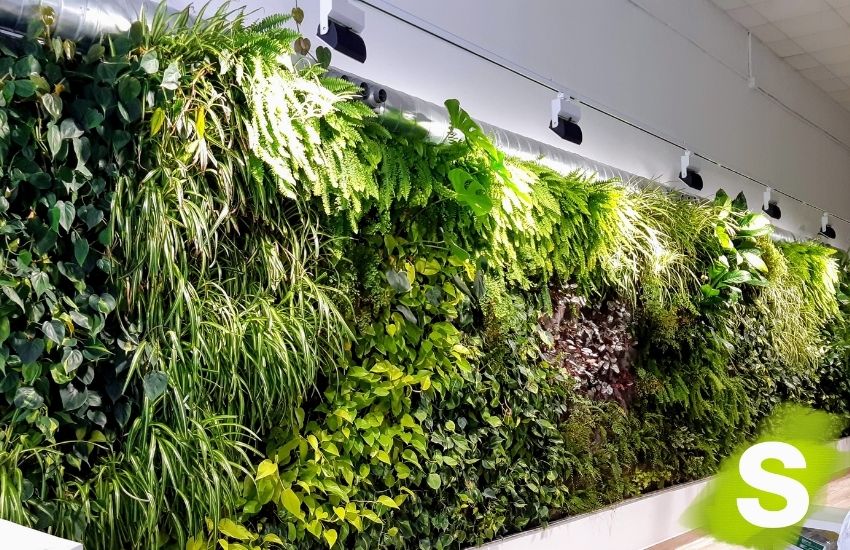At SingularGreen, we want to contribute our part during this time when the coronavirus is changing our way of life.
We have 10 years of experience installing the SingularAir plant-based air conditioning system, which allows indoor spaces to be climatized and air filtered through an interior vertical garden.
In this article, we aim to explain how SingularAir improves indoor air quality and helps prevent the spread of the coronavirus (SARS-CoV-2), which causes COVID-19.

How the SingularAir Plant-based Air Conditioning System Works
In short, this system consists of an interior vertical garden (F+P, LeafSkin) through which the air of the area we want to climatize is recirculated.
It can be installed as a complement to a conventional air conditioning system, acting as a pre-filter, or independently with its own ventilation system.
The air is absorbed through the vertical garden, passes through the air supply system, and is returned to the area we want to climatize and improve air quality.
How Does the SingularAir System Improve Air Quality?
As the air passes through the plants, their roots, and the substrate of the vertical garden, it undergoes the following transformations:
Regulates relative humidity:
If the humidity is low, it increases it to a range between 50-80%. If the humidity exceeds this range, the vertical garden absorbs the excess. Traditional air conditioning and heating systems lower relative humidity below 50%, which dries out the mucous membranes in our throat and lungs.
Reduces energy consumption:
It cools the air in summer through evaporative cooling. The evapotranspiration of the plants and substrate reduces the temperature of the air passing through them.
Installing a SingularAir system in areas with low relative humidity, such as Madrid, results in energy savings of 60%-80%. In more humid areas like Valencia, savings are around 20%-40%. These savings occur even when the system is installed as a complement to an existing air conditioning system.
Removes Suspended Particles
The SingularAir plant-based air conditioning system absorbs between 20% and 30% of PM10 and PM2.5 suspended particles with each air circulation. This means it can reduce these particles by 99% after 8 hours of operation in a closed environment. The advantage is that this system acts as a filter that does not require maintenance, cleaning, or replacement.
Removes NOx
The SingularAir plant-based air conditioning system absorbs 50% of NOx with each air circulation. It is one of the few commercial systems capable of capturing NO2 and NO, pollutants emitted by diesel engines and one of the main causes of health problems in our cities.
Removes Specific Pollutants
The plant species installed in the system absorb pollutants produced by objects and materials in our homes and offices, such as formaldehyde, benzene, xylene, carbon monoxide, and trichloroethylene, according to a famous NASA study.
SingularAir and the Spread of COVID-19
SingularAir prevents the spread of the coronavirus (SARS-CoV-2, the cause of COVID-19) in two ways:
Directly:
By filtering particles (PM10 and PM2.5) to which the virus adheres, and by creating a high relative humidity environment that hinders its spread.
Indirectly:
By improving the health of our respiratory system, making it more resistant to the virus.
Here is an explanatory video about the SingularAir plant-based air conditioning system:
Maintains Relative Humidity Above 50%
Maintaining a humid environment in enclosed spaces helps slow the spread of the coronavirus. According to a recent study by Yale University published in the Annual Review of Virology, as humidity increases, virus transmission decreases.
Experiment Development:
To demonstrate this, an experiment was conducted using various animals, particularly guinea pigs, as they share properties similar to humans. The experiment was conducted as follows:
Four pairs of infected and uninfected guinea pigs were placed in climate-controlled chambers, where airflow was directed from the infected guinea pigs to the uninfected ones. At 20°C, virus transmission was low with high relative humidity (RH) at 80%. Conversely, transmission was highly efficient at low relative humidity (20-35%) at 20°C. Viral transmission was generally more efficient at 5°C compared to 20°C.
Experiment Conclusion:
The experiment demonstrated that cold, dry air, typical of winter, helps viruses like SARS-CoV-2 spread more easily among people. However, as humidity increases, the risk of transmission decreases.
When outside air is heated or cooled by climate control systems, even indoors, humidity can drop to as low as 20%.
With the SingularAir system, we ensure that the relative humidity of indoor air is always above 50%.
Cares for Our Lungs
Maintaining a humid environment enhances immune response.
A study by Akiko Iwasaki from Yale University observed that animals infected in environments with relative humidity above 50% developed stronger immune responses to the virus compared to those infected in dry conditions.
Our lungs are better prepared against the coronavirus when we ensure that the mucous membranes remain moist.
Maintaining low levels of pollutants reduces transmission and mortality rates
It is no coincidence that the regions with the highest mortality rates from the SARS-CoV-2 virus are also the most polluted areas on the planet. The lethality of SARS-CoV-2 doubled in the most polluted regions of China.
Recently, scientists have identified air quality as a facilitator of contagion and a determinant of COVID-19 mortality. The European Public Health Alliance confirmed that pollution can exacerbate the risk of mortality from COVID-19. This is due to toxic air particles that can lead to respiratory diseases, hypertension, and diabetes.
Benefits of SingularAir
Reduction of energy consumption in summer:
Si lo instalamos conjuntamente con una instalación de aire acondicionado convencional SingularAir complementa al sistema de aire acondicionado, el jardín vertical actúa como prefiltro y disminuye el consumo energético en verano.
Maintenance of air quality:
The absorption of specific pollutants such as benzene, trichloroethylene, and NOx is the main feature that differentiates the SingularAir system. While there are many ways to maintain high relative humidity and absorb suspended particles, SingularAir is one of the few systems capable of keeping indoor air quality free from these elements, thus improving the respiratory health of its occupants.
To give you an idea of this, we present the following tables and graphs from a study conducted on our LeafSkin system by the CARTIF technological center:
In conclusion, it is important to emphasize that while we can reduce the spread of the virus by improving air quality, the virus can still be transmitted between close individuals and through surfaces. Therefore, you should continue washing your hands, practicing social distancing, and following the other recommendations from the government..







